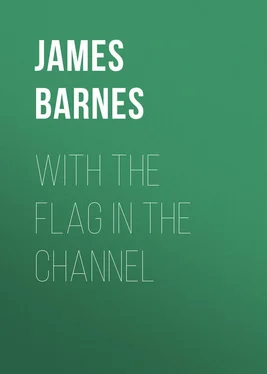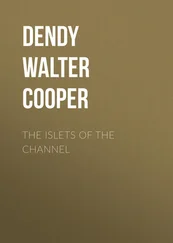James Barnes - With The Flag In The Channel
Здесь есть возможность читать онлайн «James Barnes - With The Flag In The Channel» — ознакомительный отрывок электронной книги совершенно бесплатно, а после прочтения отрывка купить полную версию. В некоторых случаях можно слушать аудио, скачать через торрент в формате fb2 и присутствует краткое содержание. Жанр: foreign_antique, foreign_prose, на английском языке. Описание произведения, (предисловие) а так же отзывы посетителей доступны на портале библиотеки ЛибКат.
- Название:With The Flag In The Channel
- Автор:
- Жанр:
- Год:неизвестен
- ISBN:нет данных
- Рейтинг книги:3 / 5. Голосов: 1
-
Избранное:Добавить в избранное
- Отзывы:
-
Ваша оценка:
- 60
- 1
- 2
- 3
- 4
- 5
With The Flag In The Channel: краткое содержание, описание и аннотация
Предлагаем к чтению аннотацию, описание, краткое содержание или предисловие (зависит от того, что написал сам автор книги «With The Flag In The Channel»). Если вы не нашли необходимую информацию о книге — напишите в комментариях, мы постараемся отыскать её.
With The Flag In The Channel — читать онлайн ознакомительный отрывок
Ниже представлен текст книги, разбитый по страницам. Система сохранения места последней прочитанной страницы, позволяет с удобством читать онлайн бесплатно книгу «With The Flag In The Channel», без необходимости каждый раз заново искать на чём Вы остановились. Поставьте закладку, и сможете в любой момент перейти на страницу, на которой закончили чтение.
Интервал:
Закладка:
“Well, indeed, Conyngham, this is a surprise!” he cried, shaking hands, after the young captain had accosted him. “And what are you doing here?”
“Fretting my head off,” was the reply. “Sure, it is a piece of ill fortune for a man like myself to be idle when there is so much that he would like to do. But before we talk of our own private grievances or affairs, tell me of the news. What has Dr. Franklin accomplished, and what prospects are there that France will do anything for us?”
“We’re all in the fog, as you sailors would say,” returned Mr. Ross. “But there are some prospects. The army at home has done as well as can be expected, although the British have possession yet of many places, including New York. But come,” he added, “you must join me to-night at supper. We’re expecting our friend Hodge down from Paris, and my brother and Mr. Allan. They can tell you much of importance. Mr. Hodge was to see Dr. Franklin, and Mr. Deane was to speak for all of us. There will be work here and plenty for good men, if I’m not out in my reckoning. The French as a nation have no love for England, nor has the king, if rumor speaks rightly, and a few big successes on our part may sway the ministry into action, for mark me, my friend, the common people are seldom wrong, and their voice is the heart-beat of the nation.”
“By the Powers,” rejoined Conyngham, “but you talk like a book. Is it a speech you have been preparing to convince the king?”
Ross laughed.
“I know of one king that was never convinced by speeches,” he returned, “and that’s the one who sits there across the water.”
“Ah, there’s one thing that will convince him,” returned Conyngham softly and dropping, as he often did, into the very richest of brogues. “Whisht, my lad, and that’s cannon-balls and straight shooting.”
“You’re right, Friend Conyngham,” answered Ross. “But there is one thing more that is necessary – supplies and ships – and a truth must be acknowledged: Europe must recognize us as a nation. Three or four big victories on our part would turn the scale. But more of this to-night when we meet. You will find me at my lodgings, there in that little gray house on the corner, the one with the sloping roof, at five o’clock, and we will go to a little tavern that I know of that is kept by a Frenchman we can trust. Don’t fail me.”
“I will be on hand,” returned Conyngham, and the two men parted.
At six o’clock that evening, in the little front room of the Chanticlear Tavern, there were five men seated about the table. The conversation, that had first been of home affairs and the discussion of the latest news from the army – the battles of Trenton and Princeton and Washington’s doings – soon turned to matters nearer at hand. Mr. Hodge, a strong-featured, red-faced man of a traditional John Bull appearance, sat between the two Ross brothers. After the waiter had left and they were all alone he began to talk, and his audience resolved themselves into the most eager listeners.
Conyngham had told his story of the capture of the prize crew, and the recital had at once placed him as one who was worthy of every confidence, and before whom everything could be said openly.
“You’d have laughed,” went on Mr. Hodge, continuing the story of his trip to Paris, “to have heard the good doctor describe his arrival in Paris. As yet he has not been received openly at court, but that will all come in due time. Nevertheless, the number of fine names and titles and high personages whom he has met would make quite a bill of lading. You see Lord Stormont, the English ambassador, has his suspicions. He would be a dolt if he hadn’t. And the Count de Vergennes, the king’s Prime Minister, has his also, but the latter’s are the harder to guess. I don’t exactly understand the Frenchman,” continued Mr. Hodge. “He’s a bit too deep for me, and whether or not he is blowing hot and cold to save time, or whether he is really anxious in the end to be of service to us, is more than I can answer for. My own idea of it is that he has but one idea in his head, and that is France, and that he would see our country swamped and ruined if he could further France’s interest in the slightest degree. He realizes, no doubt, that in England’s troubles and difficulties lie France’s opportunities, and that the more she is weakened and distressed, the easier it will be for France when the war comes; for, mark my words, the temper of the French people can not long be restrained, and sooner or later England and this country will be at each other’s throats. But, nevertheless, gentlemen, it is well worth our time to keep a wary eye on M. le Comte de Vergennes, and mind his doings carefully. But I have digressed. I was speaking of Franklin – he told me that Lord Stormont had objected to his coming to Paris at all, and said that ‘if this arch-rebel reaches the city I will away home with me, bag and baggage.’ ‘All right,’ says de Vergennes, ‘anything to please your excellency! We will despatch a messenger to stop him.’ And so a messenger was sent to meet the diligence by which ‘Goodman Richard’ was coming into Paris, but the messenger took the wrong road and never met the doctor, and the first thing you know Lord Stormont hears that the ‘arch-traitor’ has arrived. ‘Heavens, mercy me!’ exclaims de Vergennes, when his lordship calls upon him. ‘How could it have happened? I will speak strongly to this fool of a messenger. I will admonish him.’ ‘But what are you going to do about it?’ insists Lord Stormont. ‘What can we do?’ returns Monsieur le Comte. ‘You can not expect us to be uncivil! Surely it is no one but an old gentleman who flies kites and writes almanacs, and we Frenchmen have a reputation for politeness to sustain. We can not ask him to leave without ceremony. It is not our way.’ So there he is,” continued Mr. Hodge, “hob-nobbing with lords and ladies and what not, and thinking great things in that great head of his; making arrangements with Beaumarchais, who is our friend with good interest now. Oh, such a man!” Mr. Hodge interrupted his long speech by throwing back his head and laughing heartily.
“Beaumarchais? Beaumarchais? I’ve heard the name,” interrupted Conyngham. “But who is he?”
“The most interesting and fantastic of creatures,” replied Mr. Hodge. “A man whose career sounds like the invention of the romancer. His real name is Caron, and he is but the son of a watchmaker, whose timepieces are celebrated. I believe that he himself was brought up to follow his father’s trade, but playing the harp attracted him more than adjusting springs and balance-wheels, and he became an instructor and harpist at the court. Being a man of parts besides of harps, and a natural born courtier, he soon made his way and became one of the petted favorites despite his lowly birth. A consummate Jack of all trades. He is the author of plays, two of which I have had the pleasure of seeing – ‘The Barber of Seville’ and ‘The Marriage of Figaro.’ The king and the queen trust him implicitly, and he has the ear of most of the noblemen, though some of them dislike him and fear his sharp wits.”
“I met him once,” interrupted Mr. Allan, “at Nantes – a quietly dressed, smooth-spoken, business-like fellow.”
“Then you don’t know him at court,” laughed Mr. Hodge, “for there he is an exquisite, and can flutter his laces and make his bow with the best of them. He has a hundred sides, and can change color like a chameleon.”
“He is a good friend of America and a hater of England,” remarked the elder Ross. “If he had his way, Lord Stormont would be packed off to London, bag and baggage, and there would be no more of this dissembling. He knows the temper of the people, and has his finger on the national pulse.”
Читать дальшеИнтервал:
Закладка:
Похожие книги на «With The Flag In The Channel»
Представляем Вашему вниманию похожие книги на «With The Flag In The Channel» списком для выбора. Мы отобрали схожую по названию и смыслу литературу в надежде предоставить читателям больше вариантов отыскать новые, интересные, ещё непрочитанные произведения.
Обсуждение, отзывы о книге «With The Flag In The Channel» и просто собственные мнения читателей. Оставьте ваши комментарии, напишите, что Вы думаете о произведении, его смысле или главных героях. Укажите что конкретно понравилось, а что нет, и почему Вы так считаете.












